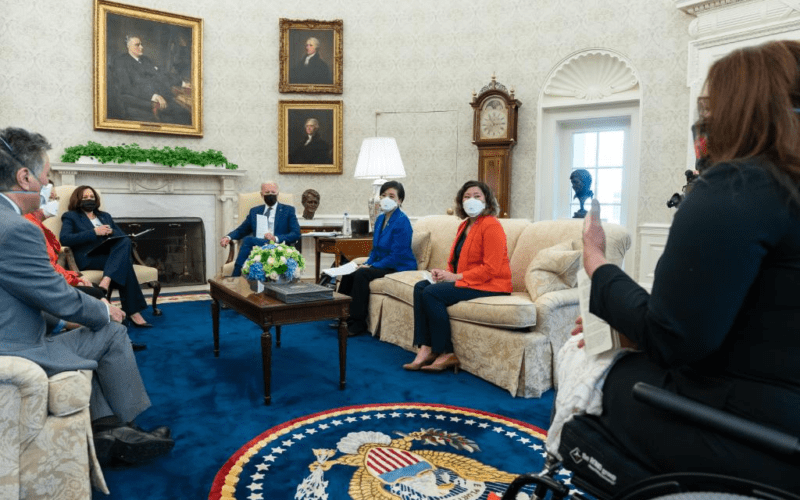Sign up here to receive The Yappie‘s weekly briefing on Asian American + Pacific Islander politics and support our work by making a donation.
President Joe Biden and Vice President Kamala Harris met with members of the Congressional Asian Pacific American Caucus (CAPAC) at the White House on Thursday as the Senate continued to debate legislation intended to combat the rise in anti-Asian hate.
During the long-awaited meeting, AAPI lawmakers urged Biden and Harris to take greater action against the surge in anti-Asian attacks, though the wide-ranging discussion also included topics such as deportations of Southeast Asian refugees and data disaggregation. The Oval Office sit-down came one month after a white gunman killed eight people, including six Asian women, in Atlanta, Georgia.
CAPAC Chair Rep. Judy Chu (D-California) told reporters that she was “pleased with the president’s responses” and described the meeting as a “very productive discussion.” Chu was joined by Reps. Grace Meng (D-New York), Mark Takano (D-California), Kaiali’i Kahele (D-Hawaii), and Doris Matsui (D-California).
In remarks delivered before the meeting, Biden said he and Harris were “heartened” by Wednesday’s 92-6 vote in the Senate, which advanced the COVID-19 Hate Crimes Act to the floor for debate. The measure, authored by Sen. Mazie Hirono (D-Hawaii), would expedite the U.S. Department of Justice’s review of COVID-related bias incidents and improve anti-Asian hate crime tracking at all levels of government.
"We need to stand with the AAPI community,” Biden said, calling for a whole-of-government response.
Here’s what else was discussed…
- Atlanta: Biden expressed “strong feelings” about the shootings in Atlanta and told lawmakers that Attorney General Merrick Garland would do everything in his power to investigate the situation, but stopped short of characterizing the attacks as a “hate crime,” according to Chu and Meng.
- AAPI appointments: CAPAC members also brought up frustrations over the lack of AAPI appointees in the Cabinet and other top positions. Chu noted that Biden committed to appointing more AAPIs to the highest levels of his administration.
- Community outreach: Erika Moritsugu, who on Wednesday was named senior liaison to the AAPI community, is expected to report directly to Biden’s deputy chief of staff Bruce Reed. Chu said she was “fully confident” Moritsugu would have the president’s ear in the West Wing.
- Immigration: Lawmakers discussed several immigration issues with Biden and Harris, including the massive family visa backlog and continued deportations of Southeast Asian refugees. Biden faced outrage from AAPI activists after federal immigration authorities deported 33 Vietnamese immigrants in March.
- Language barriers: CAPAC members pushed Biden to issue a federal memorandum to all departments about the need for accessible resources and materials for the AAPI community, particularly individuals with limited English proficiency.
- Data disaggregation: Chu said Biden was “very enthused” about the need to disaggregate data, a step advocates have long called for as a way to understand the diverse needs of AAPI communities. Domestic policy advisor Susan Rice said in a February statement that the Biden administration is “focused on improving federal data disaggregation” and “ensuring equal opportunities for AAPI communities.”
CAPAC leaders have been unhappy with Biden for months, however, dating all the way back to the day he was elected.
As the Biden team began gathering its list of potential Cabinet appointees ahead of inauguration, AAPI lawmakers expressed discontent with the president’s lack of outreach to the community. In December, 116 current and incoming Congress members sent a bicameral letter to Biden urging him to appoint an AAPI secretary.
“For too long, AAPIs have been overlooked in critical decisions pertaining to diversity, equity, and inclusion, and AAPIs continue to be left out of important policy discussions impacting communities of color,” the letter said.
AAPI lawmakers also repeatedly pushed to meet with the president, to no avail. Though they shared their concerns with Harris, Biden’s final Cabinet became the first without an AAPI secretary in over 20 years.
“The choice to not name a single AAPI Cabinet Secretary, even after over 115 members of the House and Senate urged President-elect Biden to do so, is historic in its consequence,” CAPAC said in a statement in January. “[N]ow, even as our communities suffer disproportionately from the coronavirus pandemic, it is incredibly disheartening to not have an equal seat at the most important policy making table in the country.”
Community organizers also publicly stated their frustrations, noting that AAPIs played a key role in delivering the election and Senate.
Only after the Atlanta shootings did the Biden administration agree to appoint more AAPIs in executive roles, spurred by Sens. Tammy Duckworth (D-Illinois) and Hirono’s threat to veto all “non-diversity” nominees.
In the current climate, activists say Mortisugu’s new position should be the first of many in the White House.
Anti-Asian hate has risen to extreme heights over the course of the pandemic, jumping 150% in the U.S.’s 16 largest cities. Some Asian Americans have had to disguise themselves in order to present as non-targets when they venture outside their homes.
It has taken its toll on their mental health, too. Most Asian American adults say reports of anti-Asian hate impact their mental health, according to a poll released this month.
But officials can’t address or prevent anti-Asian hate crimes if they don’t accurately track them to begin with, as police remain largely unequipped to identify anti-Asian bias. Only 2% of U.S. law enforcement officers are Asian American.
A recent Gothamist/WNYC investigation found that the New York Police Department fails to accurately identify and report anti-Asian hate crimes, contributing to inaccurate data in a city that has seen some of the most heinous anti-Asian hate crimes. Hirono’s bill—and its counterpart, sponsored by Meng—aims to address these types of systemic issues.
Final passage of the COVID-19 Hate Crimes Act, which initially faced pushback from Republicans, will depend on Senate leaders reaching a deal on amendments. Roughly two dozen GOP amendments have been filed so far, according to Hirono, including some that “have absolutely nothing to do with the bill.”
The House Judiciary Committee is expected to mark up companion legislation next week.









